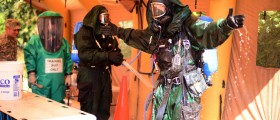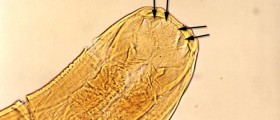
There are several diseases that can be contracted by eating contaminated or infected meat, but the most common one is definitely trichinosis or trichinellosis.
What is trichinosis?
Trichinosis or trichinellosis is a disease that can be contracted by eating meat that contains the larvae of a roundworm or nematode called Trichinella. Trichinella spiralis is the most common species. This disease cannot be spread through human contact but from eating undercooked contaminated meat. Trichinella is usually found in pork or in game meats.
The cycle of contamination begins when an animal eats contaminated meat of another animal, which contains cysts. The cysts dissolve in the stomach, releasing worms that inhabit the intestines and grow into adult ringworms. The female worm releases new larvae which travel through the bloodstream to the muscles, where new cysts are formed. If a person eats such meat containing cysts, he or she will contract the parasite.
Because today the society is more aware of the dangers of trichinosis, thanks to campaigns and laws forbidding feeding raw meat to pigs, the number of trichinosis cases is significantly decreased and today it is associated mainly with wild game meat.
Symptoms of trichinosis
The time that goes by between eating infected meat and getting the first symptoms depends on the amount of cysts present in the meat and on the quantity of meat that is eaten, but it commonly ranges from one to 45 days. Symptoms can be quite mild and even go unnoticed. However, if and when they appear, they include fever, abdominal pain, cramps, nausea, diarrhea, fatigue, possibly with cough, headache, chills and muscle pain. In severe cases, there may be heart and respiration problems.
Treatment and prevention of trichinosis
There are medications that can be given to a person who contracted trichinosis from infected meat. The drugs will kill the worms in the intestines but they cannot destroy the cysts that, unfortunately, remain dormant in the muscle tissue. In mild cases, the symptoms go away in a few months, although fatigue and muscle ache can last for longer. In severe cases, the patient will have to be admitted to a hospital, where he or she will receive intravenous medication.
The prevention mainly consists of avoiding meat that has not been thoroughly cooked. Curing, salting, drying or microwaving the meat does not kill the larvae. Raw meat but be frozen and kept at subzero temperatures. The juices from the meat must be clear, not bloody and the kitchen surfaces used to prepare meat must be cleaned and sterilized after handing raw meat.
- medlineplus.gov/ency/article/001391.htm
- www.cdc.gov/parasites/toxoplasmosis/gen_info/faqs.html
- Photo courtesy of Poecus by Wikimedia Commons: commons.wikimedia.org/wiki/File:Meat.jpg

















Your thoughts on this
Loading...